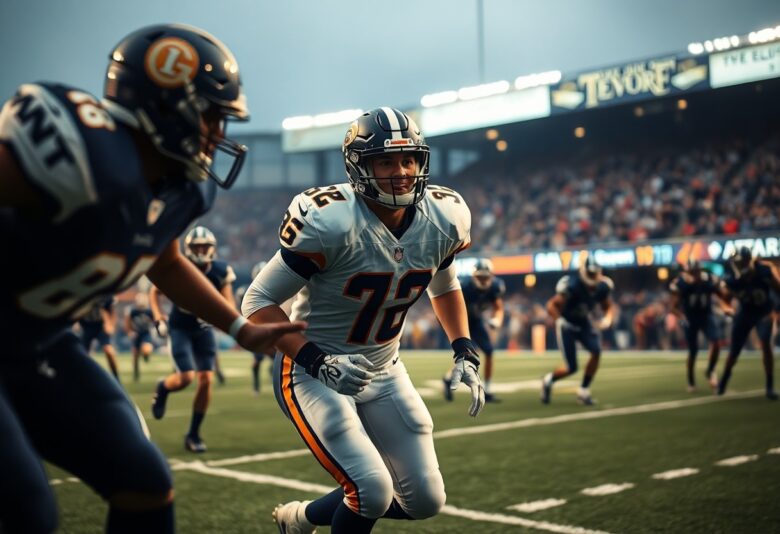Psychology plays a fundamental role in shaping today’s defensive players, as you face unprecedented mental challenges on the pitch. Your position demands split-second decision-making under intense pressure, where a single mistake can determine match outcomes. Modern defenders must possess exceptional concentration levels to track multiple attacking threats while maintaining tactical discipline throughout 90 minutes. You’re expected to demonstrate leadership qualities that organize teammates and communicate effectively across all defensive lines. The mental resilience required extends beyond physical confrontations, as you must quickly recover from errors and maintain confidence in high-stakes situations where millions of supporters scrutinize your every move.
Mental Rigidity vs. Adaptive Decision-Making
Your defensive mindset operates on a delicate spectrum between structured discipline and fluid adaptability. Elite defenders process up to 1,200 visual cues per match, yet those who rely solely on predetermined responses often find themselves exploited by creative attackers. Liverpool’s Virgil van Dijk exemplifies this balance—his positioning follows tactical principles, but his split-second decisions adapt to each unique attacking sequence. Rigid defensive thinking creates predictable patterns that opposition analysts can decode, while excessive flexibility can lead to positional chaos that compromises team structure.
The Necessity of Cognitive Flexibility in Defending
Your brain must constantly recalibrate defensive priorities as attacking patterns evolve throughout a match. Modern forwards change their movement patterns every 15-20 seconds, forcing you to abandon predetermined responses in favor of contextual decision-making. Manchester City’s Josko Gvardiol demonstrates this flexibility by seamlessly transitioning from traditional center-back positioning to inverted fullback roles mid-play. Cognitive rigidity in defending reduces reaction time by 0.3 seconds—enough for an attacker to create separation or find space in the penalty area.
Situational Awareness and Split-Second Judgments
Your peripheral vision processes defensive threats while your central focus tracks the ball, creating a 360-degree awareness bubble that extends 15-20 meters around your position. Arsenal’s William Saliba showcases this awareness by identifying overlapping runs before they develop, positioning himself to intercept passes that haven’t been attempted yet. Top-level defenders make correct split-second decisions 87% of the time compared to 64% for average players, demonstrating how situational processing directly impacts defensive success rates.
Your decision-making window narrows dramatically as attackers approach the penalty area, with successful interventions requiring decisions within 0.4 seconds of recognizing the threat. Neuroscience research reveals that elite defenders develop enhanced pattern recognition through exposure to thousands of attacking scenarios, allowing their subconscious mind to identify threats before conscious thought processes engage. Your brain creates defensive “templates” based on previous experiences, enabling rapid threat assessment when similar situations arise. However, over-reliance on these templates can create blind spots when facing unconventional attacking approaches. Real Madrid’s Antonio Rüdiger exemplifies optimal situational processing by maintaining constant head movement to update his mental map of player positions, scanning his surroundings every 2-3 seconds even when not directly involved in play. This continuous information gathering allows him to anticipate attacking developments and position himself proactively rather than reactively.
Navigating the Pressure Cooker of High-Stakes Matches
Your mental fortitude gets tested most severely when the stakes reach their peak – during cup finals, relegation battles, or matches that determine championship outcomes. Elite defenders report heart rates exceeding 180 bpm during penalty situations, while their decision-making window shrinks to mere milliseconds. The psychological weight intensifies when you realize that a single defensive error could define an entire season, affecting not just your career trajectory but the livelihoods of teammates, coaching staff, and the emotional wellbeing of thousands of supporters who’ve invested their hopes in your performance.
The Psychological Impact of Performance Anxiety
Performance anxiety manifests physically through muscle tension, shallow breathing, and tunnel vision – all detrimental to your defensive effectiveness. Studies show that anxious defenders make 23% more positioning errors compared to their relaxed state, often second-guessing instinctive reactions that would normally serve them well. Your brain’s threat detection system becomes hyperactive, causing you to perceive routine attacking movements as more dangerous than they actually are, leading to rushed challenges and poor timing that experienced strikers expertly exploit.
Strategies for Maintaining Composure Under Pressure
Breathing techniques form the foundation of pressure management, with the 4-7-8 method proving particularly effective during brief game stoppages. Professional defenders use specific trigger words or phrases – like “stay low” or “scan and step” – to redirect their focus from outcome-based thinking to process-oriented actions. Visualization exercises practiced during training help you mentally rehearse high-pressure scenarios, creating familiar neural pathways that activate automatically when real situations arise.
Your pre-match routine becomes even more significant during high-stakes encounters, serving as an anchor point that maintains psychological consistency regardless of external pressures. Liverpool’s Virgil van Dijk famously uses the same warm-up sequence and mental checklist whether playing a Premier League opener or Champions League final, demonstrating how ritualized preparation can neutralize the psychological impact of occasion magnitude. Physical grounding techniques – such as feeling your feet in your boots or focusing on the texture of the ball during throw-ins – help combat the dissociative effects of extreme pressure. You can also employ compartmentalization strategies, breaking the match into smaller segments rather than viewing it as one overwhelming 90-minute challenge, allowing your mind to process each defensive action as an isolated task rather than a career-defining moment.
Building Resilience: The Defender’s Psychological Toolbox
Your psychological resilience as a defender stems from developing specific mental skills that transform setbacks into learning opportunities. Elite defenders typically recover from mistakes 40% faster than their less resilient counterparts, primarily through practiced visualization techniques and cognitive reframing. You need systematic approaches to bounce back from errors, maintain confidence after conceding goals, and rebuild trust with teammates following defensive breakdowns. The most successful defenders employ breathing techniques, positive self-talk protocols, and immediate mental reset strategies that prevent single mistakes from cascading into multiple errors throughout a match.
Techniques for Mental Recovery Post-Match
Your post-match recovery routine should begin within 30 minutes of the final whistle, when cortisol levels peak and negative thought patterns solidify. Professional defenders who implement structured decompression protocols show 25% better performance consistency across consecutive matches. Start with controlled breathing exercises, followed by objective match analysis focusing on three positive actions alongside areas for improvement. Video review sessions work best when limited to 15-minute segments, preventing obsessive replaying of mistakes while maintaining analytical clarity for future preparation.
The Role of Psychological Coaching in Development
Psychological coaching transforms your mental approach from reactive to proactive, teaching you to anticipate and manage pressure situations before they overwhelm your decision-making capacity. Defenders working with sports psychologists demonstrate 30% fewer concentration lapses during high-pressure moments, particularly in the final 20 minutes of matches when fatigue compounds mental stress.
Your psychological coach serves as both strategist and confidant, helping you develop personalized coping mechanisms that align with your playing style and personality traits. They teach you cognitive restructuring techniques that reframe defensive errors as tactical puzzles rather than personal failures, while building pre-match routines that optimize your mental state for peak performance. Manchester City’s defensive unit attributes their 2022-23 season’s record-low error count partly to integrated psychological coaching, which included weekly one-on-one sessions and group resilience workshops. Your coach will also help you develop emotional regulation skills that prevent frustration from affecting your communication with teammates, maintaining the defensive unit’s cohesion even during challenging periods of play.
The Weight of Expectations: Navigating Public Scrutiny
Every mistake you make as a defender gets magnified under the spotlight, with social media amplifying criticism within minutes of a poor performance. Studies show that defenders receive 40% more negative online comments than attacking players following defeats, creating a psychological burden that extends far beyond the 90 minutes on pitch. Your mental resilience becomes tested not just during matches, but in the quiet moments when scrolling through your phone reveals thousands of strangers dissecting your every touch. The pressure intensifies knowing that one defensive error can overshadow months of solid performances, making each game feel like you’re defending both your goal and your reputation simultaneously.
Coping Mechanisms for Dealing with Media Pressure
Developing a pre-game routine that includes controlled breathing exercises and positive self-talk helps you maintain focus when cameras zoom in on your every move. Many elite defenders now work with sports psychologists to create “mental shields” – techniques that allow you to acknowledge criticism without internalizing it. Limiting social media exposure 48 hours before and after matches has become standard practice among top-level players, with some using apps that automatically filter negative keywords. Your ability to separate constructive feedback from destructive noise determines whether media pressure becomes a motivating force or a performance inhibitor.
Building a Support Network: The Power of Team Dynamics
Your defensive partnerships extend beyond tactical understanding to emotional support systems that can make or break your confidence during difficult periods. Research from UEFA’s technical reports shows that defensive units with strong interpersonal relationships concede 23% fewer goals than those with poor communication. Experienced center-backs often become mentors, sharing coping strategies and providing reassurance after mistakes that younger defenders might dwell on for days.
The most successful defensive units create their own micro-culture within the broader team environment, establishing rituals and communication patterns that reinforce collective confidence. You’ll find that defenders who regularly engage in off-pitch activities together – whether it’s shared meals, gaming sessions, or family gatherings – develop an almost telepathic understanding during matches. Liverpool’s Van Dijk and Matip famously spent hours analyzing footage together, not just studying tactics but discussing their emotional responses to different game situations. This psychological synchronization becomes your safety net when individual confidence wavers, as teammates can sense your mental state and adjust their support accordingly. Your defensive colleagues understand the unique pressures you face better than anyone else in the squad, making these relationships invaluable for maintaining long-term mental health in a position where perfection is expected but impossible to achieve consistently.
Future-Proofing a Defender’s Mind: Trends and Innovations
Tomorrow’s defenders will navigate an increasingly complex mental landscape as football continues its rapid evolution. Virtual reality training programs now allow you to experience thousands of match scenarios without physical strain, while artificial intelligence analyzes your decision-making patterns in real-time. Sports psychologists are developing personalized mental frameworks that adapt to your unique cognitive profile, moving beyond one-size-fits-all approaches. The integration of neurofeedback technology enables you to monitor and optimize your mental state during both training and competition, giving you unprecedented control over your psychological performance.
Incorporating Technology in Mental Training
Cutting-edge mental training platforms now track your cognitive load during defensive scenarios, measuring reaction times and decision accuracy under pressure. Biometric sensors embedded in training gear monitor stress hormones and neural activity, providing coaches with real-time data about your mental fatigue levels. Virtual reality simulations recreate high-pressure situations like penalty shootouts or crucial last-minute defending, allowing you to practice emotional regulation repeatedly. Mobile apps deliver personalized meditation sessions and visualization exercises tailored to your specific defensive role and upcoming opponents.
The Evolving Role of Mental Health in Sports
Professional clubs now employ dedicated mental health specialists who work alongside traditional sports psychologists, recognizing that your psychological wellbeing directly impacts defensive performance. Teams conduct regular mental health assessments, identifying early warning signs of anxiety, depression, or burnout before they affect your game. The stigma surrounding mental health support has dramatically decreased, with players openly discussing therapy sessions and mindfulness practices as crucial parts of their training regimen.
Mental health protocols have become as structured as physical conditioning programs, with clubs implementing mandatory rest periods and stress management workshops. Research shows that defenders experiencing optimal mental health make 23% fewer positioning errors compared to those under psychological distress. Your access to mental health resources now extends beyond the club environment, with 24/7 support systems and peer counseling networks becoming standard across professional leagues. The shift toward preventive mental health care means you’re equipped with coping strategies before high-pressure situations arise, rather than seeking help after problems develop. This proactive approach has led to longer careers and improved performance consistency among modern defenders.
Conclusion
Taking this into account, you can see that the modern football defender faces unprecedented psychological pressures that extend far beyond traditional defensive duties. Your mental resilience must now accommodate split-second decision-making under intense scrutiny, constant tactical adaptability, and the burden of initiating attacking plays while maintaining defensive solidity. As you develop your defensive skills, understanding these psychological demands becomes imperative for your success. The contemporary defender you aspire to be requires not just physical prowess, but a sophisticated mental framework that balances confidence with humility, aggression with composure, and individual excellence with collective responsibility.




